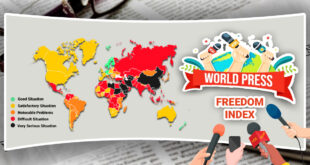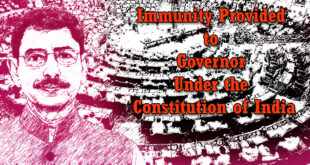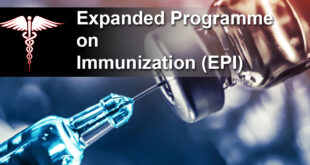A Constitution Bench of the Supreme Court on Tuesday said a fresh affidavit submitted by the Union government saying Jammu and Kashmir is witnessing an “unprecedented era of peace, progress and prosperity” after its special status under Article 370 was abrogated on August 4, 2019, has “no bearing on the constitutional challenge” to the repeal of the provision.
Article 370
Article 370 of the Indian Constitution was a special provision that granted autonomous status to the former state of Jammu and Kashmir. It was incorporated into the Constitution in 1949, soon after India gained independence from British colonial rule. Article 370 granted Jammu and Kashmir a considerable degree of autonomy, including the ability to have its own constitution, separate flag, and independence over matters of governance, except for defense, foreign affairs, and communications.
Under Article 370, the Indian Parliament could only enact laws in consultation with the Jammu and Kashmir state government. Additionally, the state had control over its own laws related to permanent residency, ownership of property, and fundamental rights.
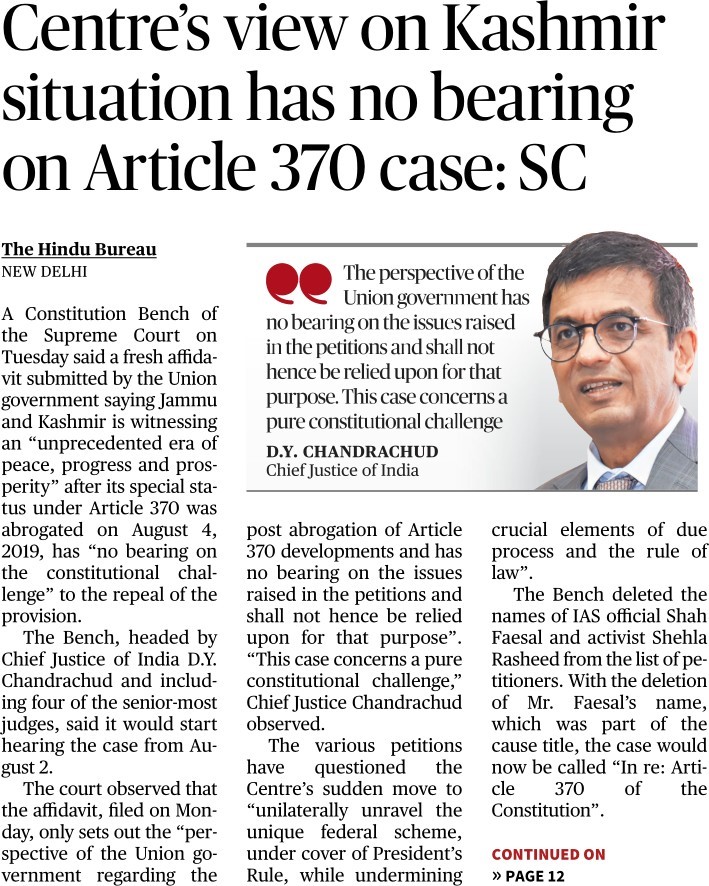
However, certain provisions of the Indian Constitution were not applicable to Jammu and Kashmir.
On August 5, 2019, the Indian government, led by Prime Minister Narendra Modi, revoked the special status of Jammu and Kashmir by passing a presidential order and subsequently introducing a bill in Parliament. The government argued that Article 370 had hindered the development and integration of Jammu and Kashmir with the rest of India and that its revocation was necessary to ensure equal rights and opportunities for the people of the region.
As a result, the state of Jammu and Kashmir was bifurcated into two separate Union Territories: Jammu and Kashmir, and Ladakh. The Union Territory of Jammu and Kashmir has a legislative assembly, while Ladakh is without a legislative assembly.
The revocation of Article 370 led to significant changes in the governance of Jammu and Kashmir. The central government has greater authority over the region, and several central laws and provisions of the Indian Constitution have been extended to the Union Territory.
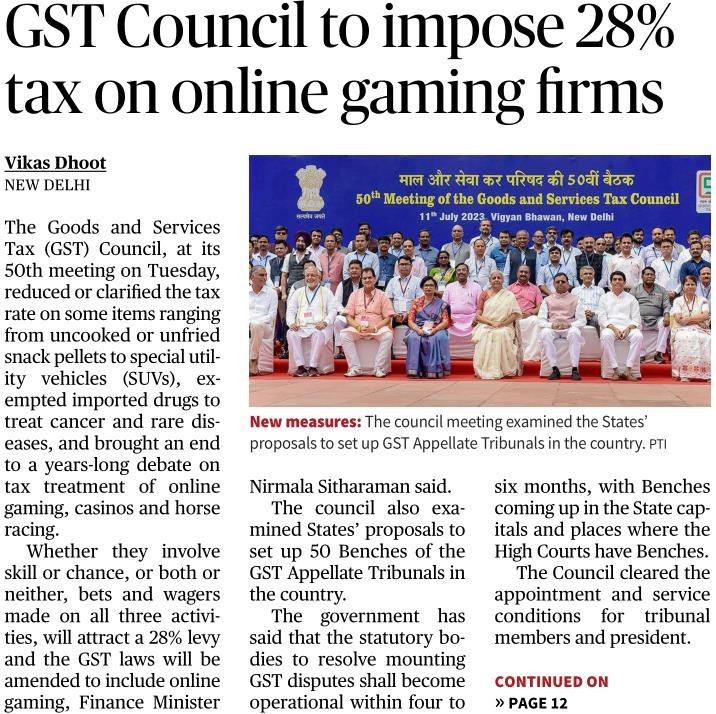
The Goods and Services Tax (GST) Council, at its 50th meeting on Tuesday, reduced or clarified the tax rate on some items ranging from uncooked or unfried snack pellets to special utility vehicles (SUVs), exempted imported drugs to treat cancer and rare diseases, and brought an end to a years-long debate on tax treatment of online gaming, casinos and horse racing.
Whether they involve skill or chance, or both or neither, bets and wagers made on all three activities, will attract a 28% levy and the GST laws will be amended to include online gaming, Finance Minister.
GST
GST stands for Goods and Services Tax. It is a comprehensive indirect tax levied on the supply of goods and services in India. The GST system replaced multiple indirect taxes levied by the central and state governments, such as excise duty, service tax, value-added tax (VAT), and others. It was implemented in India on July 1, 2017.
The GST system in India is divided into two components: the Central Goods and Services Tax (CGST), levied by the central government, and the State Goods and Services Tax (SGST), levied by the state governments. Additionally, an Integrated Goods and Services Tax (IGST) is levied on inter-state supplies of goods and services and is collected by the central government.
The GST rates in India are classified into different slabs, including 0%, 5%, 12%, 18%, and 28%. Certain goods and services are exempt from GST or are taxed at a nil rate.

Changes to conservation laws must be backed by scientific evidence
The Forest (Conservation) Amendment Bill, 2023, that is being deliberated upon by a Joint Committee of Parliament, is a contentious piece of legislation that signals the complex challenges involved in balancing industrial development and the conservation of forests.
While industrialisation inevitably means usurping greater tracts of forest land and ecosystems, the Forest (Conservation) Act, 1980 has been the mantelpiece legislation that has empowered the state to regulate this and impose costs on such industrial exploitation.
It is tree cover in orchards, plantations and village homesteads that has been on the rise and supplementing India’s claim that 24% of its area is under forest and tree cover. India has committed to increasing this number to 33% and adding a carbon sink of 2.5 billion to 3 billion tons of CO2 this way, by 2030, as part of its international climate commitments.
Green Washing
Greenwashing refers to the practice of misleadingly presenting a company, product, or initiative as environmentally friendly or sustainable when it actually does not meet the claimed environmental standards. It involves using marketing tactics or PR strategies to create a false perception of environmental responsibility in order to attract customers or improve public image.

Prime Minister Narendra Modi has been pushing for a Uniform Civil Code (UCC) and is blaming the Opposition for trying to “instigate” Muslims on the issue. In 2017, the Supreme Court struck down triple talaq as illegal. In a society that aims to be egalitarian, laws that are discriminatory to various sections of society have to be amended progressively.
Personal laws that cover marriage, divorce, succession, inheritance, adoption, alimony and maintenance are a pernicious legacy of the British Raj.
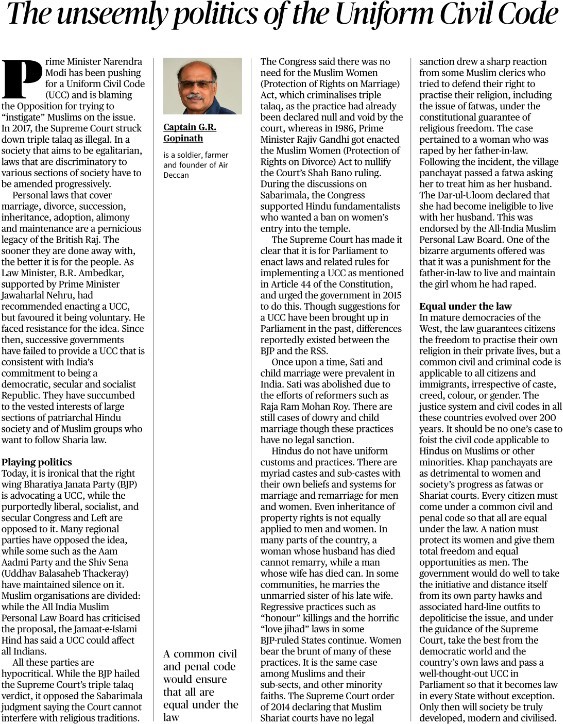
Equal under the law
In mature democracies of the West, the law guarantees citizens the freedom to practise their own religion in their private lives, but a common civil and criminal code is applicable to all citizens and immigrants, irrespective of caste, creed, colour, or gender. The justice system and civil codes in all these countries evolved over 200 years.
UCC
UCC stands for Uniform Civil Code. It is a proposed legal framework that aims to replace personal laws based on religious customs and traditions with a common set of laws governing matters such as marriage, divorce, inheritance, and adoption for all citizens of a country, regardless of their religious affiliations.
The concept of a Uniform Civil Code is often discussed in the context of countries with diverse religious communities, where different religious groups have their own separate personal laws. These personal laws are often based on religious scriptures, traditions, and customs and can vary significantly between different religious communities.
In India, the Constitution allows for the implementation of a Uniform Civil Code under Article 44(DPSP), but it has not been enforced so far. The debate on implementing a Uniform Civil Code in India has been ongoing for many years, with various stakeholders expressing differing opinions and concerns.
Article 44
Article 44 of the Indian Constitution is a directive principle of state policy that pertains to the Uniform Civil Code (UCC). It states:
“The State shall endeavour to secure for the citizens a uniform civil code throughout the territory of India.”
Article 44 is one of the directive principles outlined in Part IV of the Indian Constitution. Directive principles are guidelines or principles that provide a moral and ethical compass for the government to follow in the formulation and implementation of policies. While they are not enforceable by the courts, they serve as aspirations for the government to strive towards.
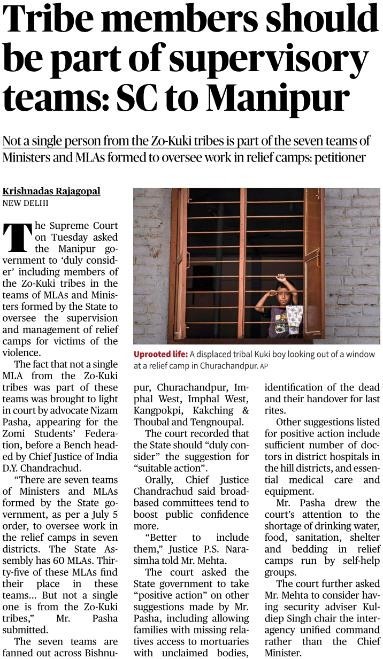
Not a single person from the Zo-Kuki tribes is part of the seven teams of Ministers and MLAs formed to oversee work in relief camps “There are seven teams of Ministers and MLAs formed by the State
government, as per a July 5 order, to oversee work in the relief camps in seven districts. The State Assembly has 60 MLAs. Thirty-five of these MLAs find their place in these teams… But not a single one is from the Zo-Kuki tribes,”
Zo-Kuki tribes
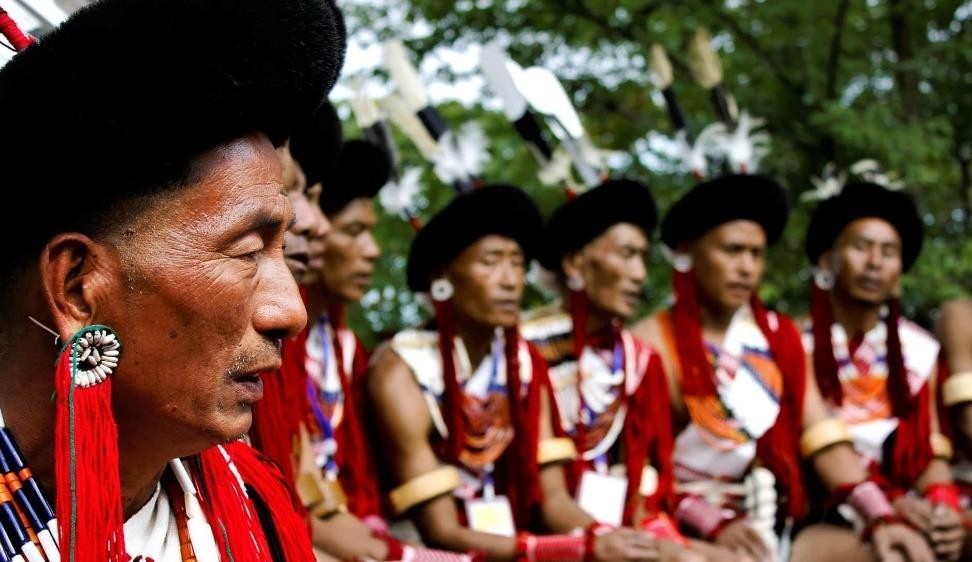
The Zo-Kuki tribes are an ethnic group primarily residing in northeastern India and western Myanmar .
They are part of the larger Zo ethnic group, which includes several sub- groups like the Paite, Hmar, Thadou, and Gangte, among others.
The term “Kuki” is an umbrella term used to refer to these various Zo tribes collectively.
The Zo-Kuki tribes have a rich cultural heritage and share common linguistic, cultural, and historical ties.
They have traditionally practiced agriculture as their primary occupation, cultivating crops such as rice, maize, and millet.
The Zo-Kuki people are known for their weaving skills, craftsmanship, and vibrant traditional attire.
Religiously, the Zo-Kuki tribes follow a mix of indigenous beliefs, Christianity, and, to a lesser extent, Hinduism.
The Zo-Kuki tribes have experienced various socio-political challenges and conflicts in both India and Myanmar.

In India, they have been involved in movements seeking recognition of their rights, preservation of their culture, and demands for greater autonomy.
In Myanmar, they have faced issues related to armed conflict and displacement.
Kuno Park
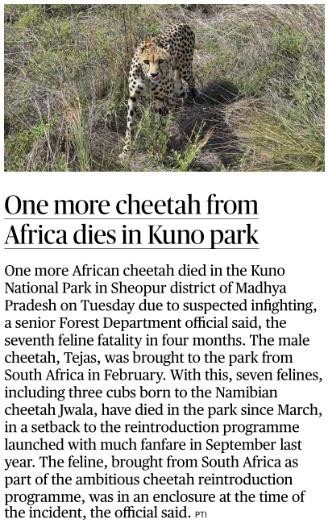
Kuno Palpur National Park, also known as Kuno Wildlife Sanctuary, is a protected area located in the Sheopur and Morena districts of Madhya Pradesh, India. It is considered a potential reintroduction site for the critically endangered Asiatic lion.
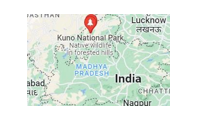

NATO leaders agreed on Tuesday to allow Ukraine to join “when allies agree and conditions are met,” the head of the military alliance said, hours after President Volodymyr Zelenskyy blasted the organisation’s failure to set a timetable for his country as “absurd”.
“We reaffirmed Ukraine will become a member of NATO and agreed to remove the requirement for a membership action plan,” NATO Secretary-General Jens Stoltenberg told reporters, referring to a key step in joining the alliance.
“This will change Ukraine’s membership path from a two-step path to a one-step path,”
NATO
NATO stands for the North Atlantic Treaty Organization. It is an intergovernmental military alliance
formed for collective defense and security cooperation among its member countries.
The organization was established on April 4, 1949, with the signing of the North Atlantic Treaty.
NATO’s primary purpose is to safeguard the freedom and security of its member nations through political and military cooperation.
Its founding principle is Article 5 of the North Atlantic Treaty, which states that an armed attack against one member shall be considered an attack against all members, and they will respond collectively, including the use of armed force if necessary.
NATO has 30 member countries, including the United States, Canada, several European nations, and Turkey. Member countries contribute to the alliance by committing to mutual defense, participating in joint military exercises and operations, and cooperating in areas such as intelligence sharing, counterterrorism, and cybersecurity.

SEBI
SEBI stands for the Securities and Exchange Board of India. It is the regulatory body that oversees and regulates the securities market in India. Established in 1988 as an independent statutory body, SEBI is mandated to protect the interests of investors and promote the development and regulation of the securities market.
SEBI operates under the Securities and Exchange Board of India Act, 1992, which grants it powers to regulate various aspects of the securities market, including issuers of securities, stock exchanges, intermediaries, and investors.
- The primary objectives of SEBI are to:
- Protect the interests of investors in securities.
- Promote the development and regulation of the securities market.
- Regulate and supervise stock exchanges and other securities markets.
- Promote and regulate self-regulatory organizations.
- Prohibit fraudulent and unfair trade practices.
- Promote investor education and awareness.
Schedule M

Schedule M, part of the ‘Drugs and Cosmetics Act, 1940’ deals with ‘Good Manufacturing Practices’ for pharmaceuticals that should be followed by pharmaceutical manufacturing units in India.
as part of the quality control drive conducted across the country, 137 firms were inspected and action had been taken against 105 firms, the Ministry said in a release on Tuesday after the Minister met with representatives from the Micro, Small and Medium Enterprises (MSME) sector pharma companies.
MSME
MSME stands for Micro, Small, and Medium Enterprises. The term is used to refer to small businesses and enterprises that operate at a relatively smaller scale in terms of investment, production, and employment. MSMEs play a crucial role in the economic development of many countries, including India.
The classification of MSMEs may vary between countries, but in India, the categorization is primarily based on the investment in plant and machinery or equipment for manufacturing enterprises, and investment in equipment for service enterprises.
The criteria for classification in India were as follows:
Micro Enterprises: Those with investment up to INR 1 and turnover up to INR 5 crore
Small Enterprises: Those with investment between INR 1 crore and INR 10 crore and turnover between INR 5 crore and INR 50 crore
Medium Enterprises: Those with investment between INR 10 crore and INR 50 crore and turnover between INR 50 crore and INR 250 crore
What is e-RUPI?

National Payments Corporation of India (NPCI) in association with Department of Financial Services (DFS), National Health Authority (NHA), Ministry of Health and Family Welfare (MoHFW), and partner banks, has launched an innovative digital solution – ‘e-RUPI’.
The users of this seamless one-time payment mechanism will be able to redeem the voucher without a card, digital payments app or internet banking access, at the merchants accepting e-RUPI. e-RUPI would be shared with the beneficiaries for a specific purpose or activity by organizations or Government via SMS or QR code.
This contactless e-RUPI is easy, safe and secure as it keeps the details of the beneficiaries completely confidential. The entire transaction process through this voucher is relatively faster and at the same time reliable, as the required amount is already stored in the voucher.
 Chinmaya IAS Academy – Current Affairs Chinmaya IAS Academy – Current Affairs
Chinmaya IAS Academy – Current Affairs Chinmaya IAS Academy – Current Affairs

